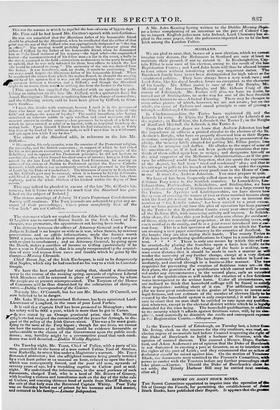The statement which we copied from the Globe last week,
that Mr. O'Leghlen was to succeed Baron Smith in the Irish Court of Ex- chequer, was premature, the appointment not having been made.
The distance between the offices of Attorney-General and a Puisne
Judge in Ireland is no longer so wide as it was, when Saurin, by revenue prosecutions and ex officio informations, made the former worth 7000/. a year, exclusive of his private practice. They are nearly on a par with respect to emolument ; and an Attorney-General, by going upon the Bench, makes a sacrifice of income so trifling (particularly if he have a seat in Parliament), that it is amply compensated liy the acquisi- tion of ease and repose from cares and trouble which he gains by the change.—Minting Chronicle.
Chief Baron Joy, of the Irish Exchequer, is said to be dangerously ill at Naples, which city he had reached on his way to a visit to Constan- tinople.
We have the best authority for stating that, should a dissolution occur in the course of the ensuing spring, upwards of eighteen Liberal Irish Members will be returned in place of Conservatives, by whom the people are at present misrepresented. The Toryism of the House of Commons will be thus diminished by the subtraction of thirty-six votes.—Dublin Correspondent of the Courier.
Not only Mrs. O'Connell, but her son Mr. Maurice O'Connell, are now believed to be in danger.
Mr. Luke White, a determined Reformer, has been appointed Lord- Lieutenant of Longford, in the room of poor Lord Forbes.
It is said that Captain Duff has been promoted to Monaghan ; where
his salary will be 8001. a year, which is more than he got in Cavan.
stated by an Orange provincial print, that Mr. William fr Olipberts had resigned the commission of the peace for Armagh, in dis- gust at the policy of the Irish Government. This was a lie most grati- fying to tire taste of the Tory bigots ; though for our lives, we cannot see how the notions of art individual could be evidence favourable or unfavourable to the claims of the Government upon the public confi- dence; nay, hostility might lie a presumptive proof that such confi- dence was well deserved.—Dublin Weekly Register.


























 Previous page
Previous page